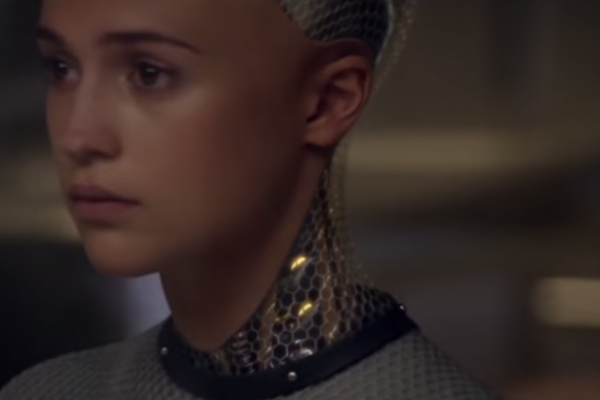The question of what makes us human has been around pretty much as long as we have. Attempts at tackling it have produced a veritable hall of fame of iconic results: Frankenstein. 2001: A Space Odyssey. The entire bibliographies of Philip K. Dick and Kurt Vonnegut. The list goes on.
But the thing about big unanswerable questions is that although we may never get closer to figuring out the answers, it can be awfully fun and rewarding to keep asking them. And with advances in society and technology, the question of our humanity — and its future — seems to transmogrify by the day.
In the grand legacy of stories about what separates us from the animals (or, in this case, androids), Ex Machina, the directorial debut of screenwriter-novelist Alex Garland (The Beach, 28 Days Later, Sunshine) is nothing new. It’s a direct descendent of Frankenstein, The Island of Doctor Moreau, and scads of stories that have come before, bringing up classic issues of nature, nurture, and what happens when we play God. But Garland’s sci-fi thriller smartly wears those influences on its sleeve, adding to them a sharply modern sense of style, with a plausible approach that’s both intriguing and troubling to consider.
Caleb (Domhnall Gleeson) is an employee at a large tech company, who wins a contest to hang out for a week with the company’s reclusive genius founder Nathan (Oscar Isaac) at his secluded house/research facility. Upon his arrival, Caleb discovers the real purpose of his visit: Nathan wants him to interact with Ava (Alicia Vikander), a robot he’s created, and determine whether she can convincingly pass for human. The conflict arises when Caleb’s true role in Nathan’s test, and Ava’s own mysterious intentions, come under suspicion. How much of Ava’s behavior is what Nathan has programmed into her, and how much is she acting on her own?
Writer-director Garland has always excelled in creating satisfying thrillers with deeper questions in mind, particularly in the realm of exploring uglier parts of human behavior. In Ex Machina, he may have created his best work yet, working with a very small cast in a limited space that gives the characters plenty of chances to turn on each other in subtle, clever ways.
Read the Full Article

